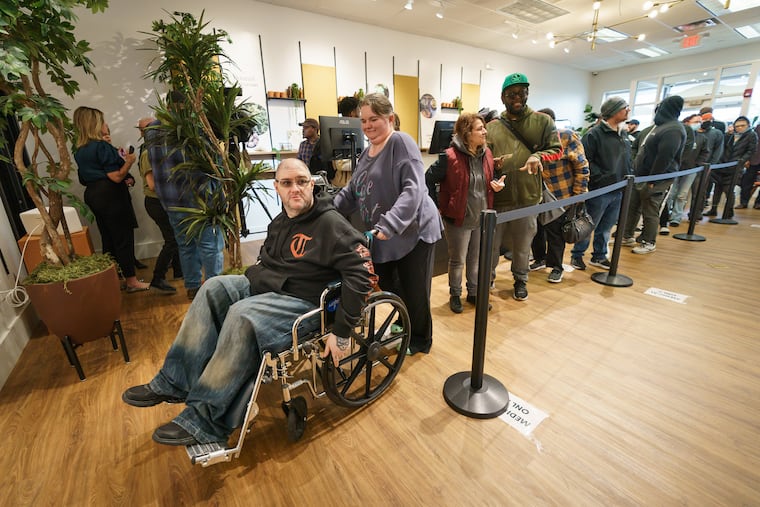Pennsylvania is surrounded by states where cannabis is legal for adults. We’re getting left behind.
Critics of legal access often raise concerns about safety, but regulated access is safer than what we have now. Plus, all the revenue is going to other states or the illicit market.

On Election Day last month, Ohio residents voted overwhelmingly to make it legal for adults to use cannabis recreationally.
On this issue, Pennsylvania is getting left behind.
With five out of six surrounding states already regulating cannabis for adult use, most Pennsylvanians live in a county that touches a legal state. Pennsylvania should join its neighbors and legalize cannabis to ensure safe access, right the wrongs of cannabis prohibition, and stop revenue from bleeding across the borders of the commonwealth.
It’s an issue with strong support among Pennsylvania voters; two in three support legalization. Gov. Josh Shapiro signaled his support of legalization in his 2023-2024 budget, and there is a bipartisan state Senate bill to make that happen.
Critics of legal access often raise concerns about safety, but regulated access is safer than what we have now, with only medical marijuana patients able to access regulated cannabis with a doctor’s recommendation, and other consumers forced into the illicit market.
When cannabis is regulated for use by adults 21 and over, youth access is diminished because consumers must show proof of age to buy products, while childproof packaging and regulations strictly prohibit marketing to children. Without legal access, consumers in Pennsylvania are purchasing unregulated, intoxicating products at smoke shops, convenience stores, or on the illicit market. These products are not regulated, and their sellers have no regard for consumer age or safety.
Plus, with so many nearby states offering legal recreational use, Pennsylvanians are simply driving across the border for legal weed — and taking their pocketbooks with them. Each purchase in a neighboring state represents lost revenue for Pennsylvania. With an estimated consumer base of two million individuals and annual sales projected to be in the billions of dollars, we must capture the revenue generated by cannabis sales instead of watching our neighboring states spend it.
In a state that requires a balanced budget, the legislature must try to raise revenue without raising taxes. Regulating cannabis for adult use will generate a new revenue stream — likely hundreds of millions per year — that can offset the need to raise taxes. Each year Pennsylvania delays adult-use legalization, it misses the potential to offset a looming budget deficit.
By acting now, the legislature can ensure that the job creation, investment, and revenue realized from legal cannabis remains in Pennsylvania. Pennsylvania’s medical program has already created more than 23,000 jobs across the state, and legalization will spur continued job and salary growth.
By comparison, a state with a similar population size to Pennsylvania — Illinois — has delivered more than $1 billion in revenues since sales of legal cannabis began in 2020. The Prairie State anticipates more than 60,000 people will be employed by the industry in 2025. Each day we fail to act results in potential jobs, revenue, and investment crossing our borders into Delaware, New Jersey, New York, Maryland, and Ohio.
Legalizing cannabis can make it easier for law enforcement to do their job, as well. The elimination of prosecutions related to personal possession of cannabis will result in significant savings in time and resources in the justice system. Roughly 20,000 Pennsylvanians are arrested every year for marijuana possession; statewide regulation would allow police to allocate their limited resources to more serious crimes.
Thanks to the state’s infrastructure related to medical marijuana, we have proven that cannabis can be safely produced and securely delivered to Pennsylvanians through an existing and robust supply chain. By expanding this existing infrastructure to include recreational use, we can keep that job and economic growth going (and beat the illicit market) while continuing this demonstrated legacy of security and compliance.
Pennsylvania should join neighboring states and regulate cannabis for adult use. To make it happen, the state legislature must quickly engage the cannabis industry, law enforcement, health-care experts, social equity advocates, and consumers.
By relying on existing medical marijuana infrastructure, the commonwealth can promptly establish a safe and reliable market while creating jobs and capturing revenue that is seeping across state lines.
Meredith Buettner is the executive director of the Pennsylvania Cannabis Coalition, the state’s cannabis trade association.